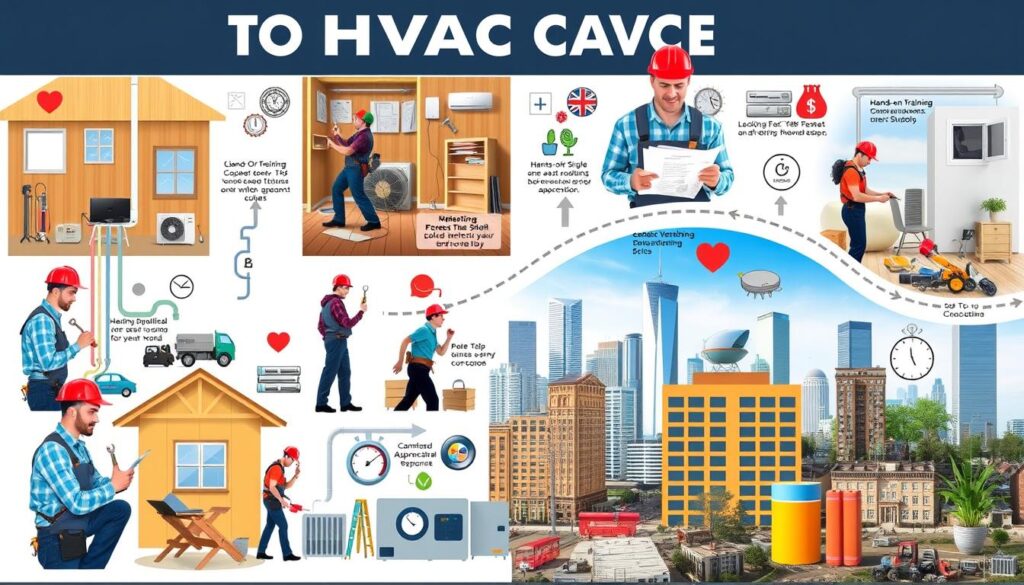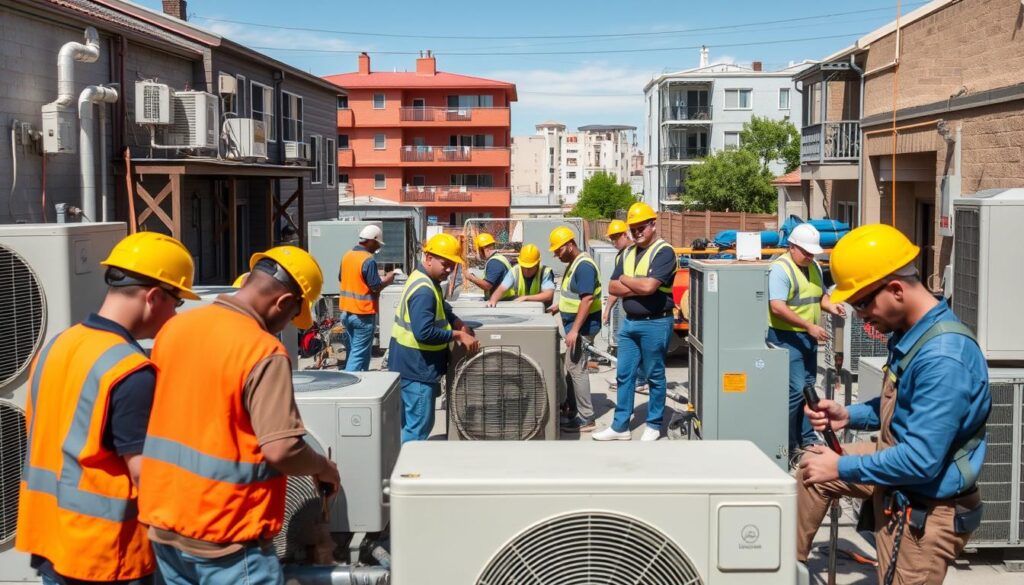Affiliate Disclosure
HVAC Guide Guys is a participant in the Amazon Services LLC Associates Program, an affiliate advertising program designed to provide a means for sites to earn advertising fees by advertising and linking to Amazon.
Can You Do HVAC Without Going to School? “The best way to predict the future is to create it.” – Peter Drucker
The HVAC (Heating, Ventilation, and Air Conditioning) industry is booming. It offers great opportunities for those looking for a rewarding career. You might wonder if you can enter this field without a college degree. This guide will look at different ways to become an HVAC technician, including formal training and other paths.

Key Takeaways
- HVAC technicians are in high demand, with a projected 15% job growth by 2026.
- Most states require a high school diploma or GED to pursue a career as an HVAC technician.
- Formal HVAC training programs can range from 6 months to 2 years, while apprenticeships typically last 3-5 years.
- Certifications like NATE and refrigerant-specific credentials are highly valued in the HVAC industry.
- Alternative paths, such as on-the-job training and apprenticeships, can provide a viable route to becoming an HVAC technician without a formal degree.
Table of Contents
Understanding the HVAC Industry and Career Path
As an HVAC technician, your job is to keep heating, ventilation, and air conditioning systems working right. You’ll read blueprints, fix problems, and make sure everything runs smoothly. Your work keeps places comfortable for everyone.
What HVAC Technicians Do Daily
HVAC technicians do many things. They include:
- Fixing broken HVAC equipment
- Connecting wires and checking electrical circuits
- Welding pipes and doing regular maintenance
- Watching how systems work and adjusting them as needed
- Helping customers and suggesting ways to save energy
The Growing Demand for HVAC Professionals
The HVAC industry is booming. It’s because people want to save energy and be kind to the planet. The Bureau of Labor Statistics says HVAC jobs will grow 15% by 2026. This means lots of chances for new careers in this field.
Types of HVAC Work Environments
HVAC technicians work in many places. This includes homes, schools, offices, factories, and hospitals. The job can be tough sometimes, but you get to work on different systems and in various settings.
The HVAC industry is a great career choice. It has lots of growth, interesting work, and different places to work. Knowing what HVAC technicians do helps you decide if this job is right for you.
Explore Our HVAC Shop
Looking for top-rated HVAC tools, parts, and accessories? Visit our shop and find the perfect solution for your needs.
Visit the ShopCan You Do HVAC Without Going to School
Many HVAC employers prefer formal education, but it’s not always necessary. Federal law doesn’t require a certificate for HVAC technicians. However, some states have their own rules. You can still get into HVAC through apprenticeships or on-the-job training.
Trade schools usually offer HVAC training in about 6 months. Big HVAC companies often hire more technicians than small ones. They might look for people with a good attitude and personality, even if they have no experience.
Trade schools stress the need for ongoing training in HVAC. This keeps you up-to-date with new tech and practices. Apprenticeships can be shorter if you have a trade school degree, making it easier to become a licensed technician.
| Requirement | Texas HVAC Technician License |
|---|---|
| License Classes | Class A and Class B |
| Endorsements | Environmental Air Conditioning, Commercial Refrigeration, and Process Cooling or Heating |
| Entry-level Requirements | EPA certification to work with refrigerants, Technician Registration or Technician Certification |
| Experience Requirement | 24 months of work experience under a licensed contractor or an approved technical training program of at least 2,000 hours |
In Texas, HVAC technicians can get Class A or Class B licenses. They also need endorsements for specific areas. Entry-level workers don’t need a license but must have EPA certification for refrigerants.
After 4 years of experience, workers can take exams to become independent contractors. Schools like Tulsa Welding School & Technology Center in Houston offer HVAC training in 7 months. This is an alternative way to start in HVAC.
Essential Skills and Qualifications for HVAC Work
To do well as an HVAC technician, you need both technical skills and soft skills. Learning these will make you more valuable to employers. It also sets you up for success in the HVAC world.
Technical Skills Required
HVAC work needs a good grasp of mechanics, electronics, and electricity. You should be able to:
- Read blueprints and schematics
- Fix and repair HVAC systems
- Install, keep up, and improve HVAC equipment
- Work safely with refrigerants
- Use tablet computers and digital tools
Soft Skills for Success
You also need soft skills to do well in HVAC. These include:
- Being great at customer service
- Being detail-oriented and solving problems
- Being good at math and managing time
- Talking well and getting along with people
- Being flexible with new trends and tech
Physical Requirements
The HVAC field also needs physical strength and endurance. You’ll have to:
- Lift and move heavy stuff
- Stand for long times
- Work in tight spots and tough places
By getting good at HVAC skills, technical knowledge, and physical tasks, you’re ready for a great HVAC career.
Explore Our HVAC Shop
Looking for top-rated HVAC tools, parts, and accessories? Visit our shop and find the perfect solution for your needs.
Visit the ShopAlternative Paths to Becoming an HVAC Technician
Starting an HVAC career doesn’t always mean a four-year degree. There are quicker, less expensive ways to get into the field. These paths can lead to a fulfilling HVAC career.
Begin with entry-level jobs like an HVAC helper or installer. This hands-on work lets you learn skills and industry knowledge without college. Many companies offer on-the-job training to help you grow.
Consider an HVAC apprenticeship program. It mixes work experience with classroom learning. You earn while you learn, and it usually takes 3-5 years to become a journeyman.
If you’ve worked in construction or electrical, you might find HVAC easy to get into. Your existing skills and knowledge of tools and systems can help a lot.
For those who want to be their own boss, starting an HVAC business is an option. This way, you can use your technical skills to build your own career path.
These non-traditional HVAC paths offer practical skills, industry connections, and cost savings. They let you find the best fit for your goals and situation.

Benefits of Formal HVAC Education and Training
Getting formal education in HVAC opens doors to many opportunities. It boosts your career and increases your earning potential. A good HVAC education is a big plus.
Career Advancement Opportunities
HVAC techs with formal training get top picks from employers. Having a NATE certification shows they know their stuff. This makes them stand out in the job hunt.
They also get hands-on experience. This lets them work on more complex systems. It sets them up for bigger roles and career growth.
Higher Earning Potential
Research shows HVAC techs with college training make more money. They get better jobs and higher pay. This is because they have the skills and knowledge needed.
Industry Recognition
The HVAC world values education a lot. Teachers with real-world experience share valuable tips. They teach everything from basics to advanced skills.
In today’s HVAC world, formal education is key. It helps techs grow their careers, earn more, and get recognized. It’s a smart move for long-term success.
Required Certifications and Licenses
Starting a career in HVAC requires getting the right certifications and licenses. While you might not need formal HVAC education, getting certified can boost your job chances and pay.
The Environmental Protection Agency (EPA) Section 608 Technician Certification is key for HVAC techs. It teaches how to handle refrigerants safely to protect the environment. There are three EPA certifications: Type I for small appliances, Type II for high-pressure systems, and Type III for low-pressure systems.
There are also other HVAC certifications that show your skills and focus. These include certifications from the North American Technician Excellence (NATE), HVAC Excellence, and the Refrigeration Service Engineers Society (RSES).
- NATE certification: It’s the top HVAC certification, showing your technical skills.
- HVAC Excellence certification: It covers many HVAC systems, proving your skills in areas like commercial refrigeration or residential heating.
- RSES certification: It’s about installing, maintaining, and fixing refrigeration and air conditioning equipment.
Getting these certifications costs between $50 to $300. You might need to pass an exam or show work experience.
Certifications are not always needed but they help a lot. They can make you more attractive to employers and increase your pay. Some places also need HVAC techs to have a license. This usually means passing a test and showing you’ve worked under supervision. So, check what your area needs to make sure you’re qualified.
Explore Our HVAC Shop
Looking for top-rated HVAC tools, parts, and accessories? Visit our shop and find the perfect solution for your needs.
Visit the ShopJob Market Outlook and Salary Expectations
The HVAC job market in the United States is growing fast. It’s expected to see a 6% increase in jobs for HVAC technicians by 2032. In 2022, there were 415,800 HVAC technician jobs. The industry will have about 37,700 job openings each year until 2032.
HVAC salaries depend on location, experience, and specialization. As of May 2022, HVAC technicians made a median of $51,390 a year. The lowest 10% made under $36,170, and the highest 10% made over $82,630. Salaries also vary by industry, with some jobs paying more than others.
Geographic Salary Variations
HVAC salaries differ by region. States like California, New York, and Texas have a high demand for HVAC technicians. This leads to higher job growth rates of 14% to 21% over the next decade. For example, HVAC mechanics in Phoenix made $46,710 a year as of May 2018, according to the Bureau of Labor Statistics.
Employment Growth Projections
The demand for HVAC services is increasing. This is due to new building construction and a focus on energy efficiency. HVAC technicians with skills in green systems and tablet use will have the best job prospects.
The HVAC job market looks promising. There are chances for career growth and higher earnings for those who get formal training and certification. By investing in their education and skills, HVAC professionals can benefit from the industry’s expanding job opportunities and competitive salaries.
Starting Your HVAC Career Without Formal Education
Starting an HVAC career without a degree is possible but needs careful planning and hard work. Entry-level HVAC jobs might be easier to find. But, you must learn self-taught skills and get practical experience to succeed in the long run.
Look into online courses, workshops, and shadowing experienced HVAC techs. This helps you learn about electrical, plumbing, and mechanical systems. These skills are crucial for HVAC work. Also, getting a mentor and hands-on training can boost your knowledge and prepare you for the job’s challenges.
- Explore online tutorials and industry-specific forums to expand your HVAC knowledge
- Attend local workshops or seminars to gain practical skills and insights from seasoned professionals
- Reach out to HVAC companies and inquire about job shadowing or internship opportunities
While going it alone has its benefits, formal HVAC education is often more thorough. These programs offer hands-on training, teach about regulations, and give you certifications. These can make you more attractive to employers and help your career grow.
“Completing a vocational HVAC program can help in building soft skills such as communication, self-management, and problem-solving abilities.”
Choosing to start an HVAC career without a degree is a big decision. It depends on your goals, resources, and the job market. With hard work, persistence, and a drive to keep learning, you can still have a fulfilling HVAC career.

Explore Our HVAC Shop
Looking for top-rated HVAC tools, parts, and accessories? Visit our shop and find the perfect solution for your needs.
Visit the ShopApprenticeship Programs and On-the-Job Training
Looking for a career in HVAC without college? Apprenticeships and on-the-job training are great options. They let you learn by doing and earn money at the same time.
HVAC apprenticeships last 3-5 years. You get both hands-on training and classroom lessons. You need to work 2,000 hours a year and study 144 hours a year. You must be 18 or older and able to do the job.
On-the-job training is more flexible. You learn by doing and get paid for it. It lets you learn at your own pace, with help from experienced HVAC pros.
Both apprenticeships and on-the-job training are good ways to start an HVAC career. They mix practical experience with learning. This way, you can become a skilled HVAC technician.
| HVAC Apprenticeship Program | On-the-Job Training |
|---|---|
| Structured program with both on-the-job training and classroom instruction | Hands-on learning while earning a paycheck |
| Typically 3-5 years in duration | Flexible learning pace |
| Minimum 2,000 hours-per-year of on-the-job training | Complemented by additional training resources or mentorship |
| Minimum 144 hours-per-year of related classroom training | Opportunity to develop practical skills and industry knowledge |
Exploring apprenticeships and on-the-job training can lead to a rewarding HVAC career. You’ll gain the skills and experience needed to succeed.
Conclusion
There are many ways to start a career in HVAC. You can jump in without college, but getting a degree can really help. The HVAC world has many ways to learn, like school, apprenticeships, and on-the-job training.
The job market in HVAC is looking up, with a 15% growth expected by 2026. This is because more people want energy-saving HVAC systems. By learning the right skills and knowledge, you can find a good job in HVAC.
It’s important to mix book learning with hands-on experience. This way, you’ll be ready for the HVAC industry’s challenges. You’ll have the skills and knowledge to succeed and meet the growing need for HVAC experts.

